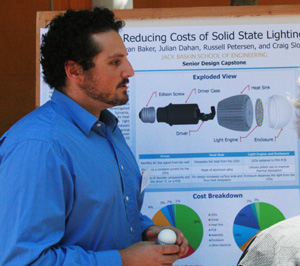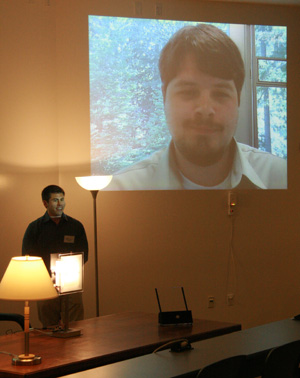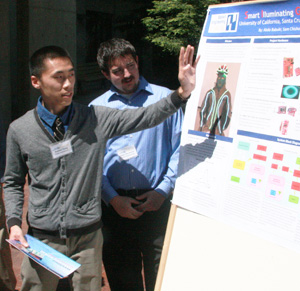Low-cost LED light bulbs, a glass microphone, an online game, and an illuminated garment for bicycle riders are among the prototypes developed by students in the Baskin School of Engineering at UC Santa Cruz working with corporate sponsors such as Google, Oracle, Texas Instruments, Applied Materials, and Corning Glass.
The engineering school's inaugural Corporate Sponsored Senior Project Program gave a dozen teams of students the opportunity to work on real-world challenges proposed by corporate sponsors. The projects fulfilled the requirement for all engineering students to do a capstone design project their senior year. Students met with industry advisers, worked in teams, and had to manage budgets and deadlines.
"At UCSC, we recognize the importance of experiential learning, where students get to work on real-world projects, and we take great pride in what our students have accomplished," said Art Ramirez, dean of the Baskin School of Engineering. "We are grateful to our corporate sponsors for their willingness to participate in this year-long program, mentor our students, and provide them with challenging projects to work on."
The student teams presented their prototypes to an audience including their industry sponsors on Thursday, May 31, at the engineering school. Dennis Monticelli, a fellow at the Texas Instruments Silicon Valley Labs, said his company likes to see students engaged in hands-on learning. "Students learn a lot from working on a real project like this--it's good training for them," Monticelli said.
The team sponsored by Texas Instruments created a computerized lighting system embedded in a jacket and helmet for bicyclists, providing illuminated patterns for visibility and signalling. Other projects were featured in an "office of the future" display, including lamps with LED bulbs built by a team sponsored by Applied Materials, an energy monitoring system developed by students sponsored by CITRIS, and a glass microphone sponsored by Corning Glass.
In the glass microphone, a plate of Corning glass picks up the vibrations of sound, which are converted to electrical signals by piezoelectric disks attached to the glass. The student team consisted of Ethan Papp (computer engineering), Jeff Bertalotto (electrical engineering), Brian McNally (electrical engineering), and Tyler Couto (electrical engineering). They demonstrated their prototype by having Bertalotto address the audience using the glass microphone via a Skype connection from an office outside the auditorium. The students said their design could potentially be integrated into any product with a pane of glass in it, such as a mirror, television, smart phone, or computer monitor. They built two freestanding microphones and one that was integrated into a desk lamp. "For now, the prototypes show that it can be done, but the idea is to integrate it into other products with glass in them," Bertalotto said.
The Smart Home Energy Monitoring Project (SHEMP), sponsored by CITRIS (the Center for Information Technology Research in the Interests of Society), provides capabilities not found in other energy monitoring products. Currently available devices such as the Kill-A-Watt products do not give consumers remote access to the data they collect or real-time viewing of the data. In their demonstration, the SHEMP team (Kevin Abas, Nathan Abercrombie, Andy Liang, David Oda, and Jason Wu) showed that their device not only provides real-time monitoring, it also allows the user to turn off an appliance remotely from the online interface.
Patrick Mantey, associate dean of industry programs and Baskin Professor of computer engineering, said the corporate sponsorship program provides many benefits for the students, but the most important are the project ideas from the companies and the time that company engineers spend working with the students. "We told the students that the company is their customer, and the projects they're working on are something the company wants," Mantey said. "It's been amazing to watch them grow and to see how much they've learned from this experience."





